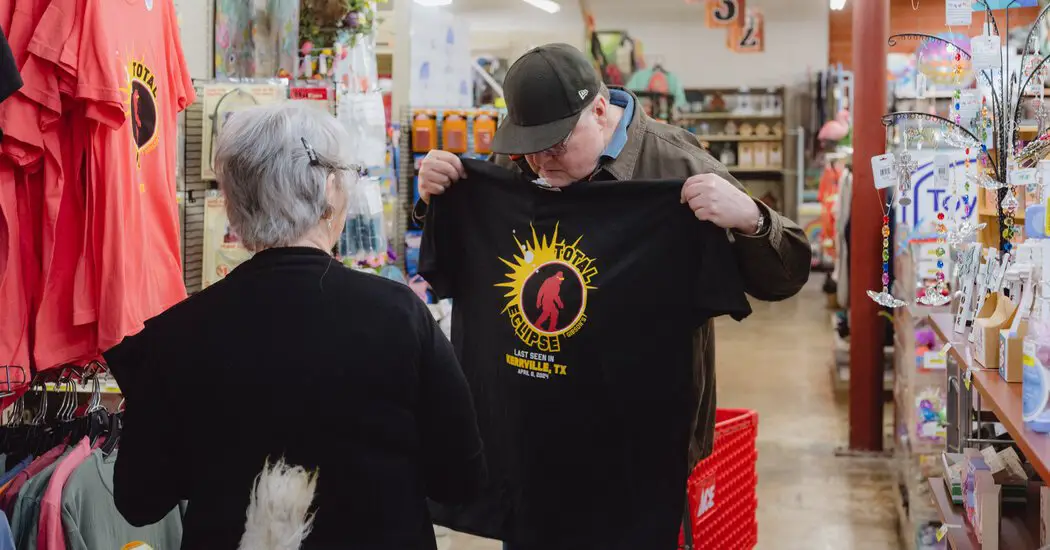A vast swath of North America will soon be plunged into darkness. Though momentary, the total solar eclipse on Monday has already proved lucrative.
Across the United States, Mexico and Canada, towns and villages have been planning what could be the biggest tourist attraction for many small cities. Larger areas that are more accustomed to hosting events are nonetheless expecting a significant windfall.
“We don’t usually have this kind of tourism — it’s not common,” said Edgar Augusto González-Zatarain, the mayor of Mazatlán, Mexico. “Nature is giving us this opportunity, and we have to take advantage of it.”
Various indicators suggest the eclipse will bolster the economies in the path of totality, a roughly 110-mile-wide belt that will stretch from Mazatlán to Montreal. Hertz said car reservations had jumped 3,000 percent from a year ago. Airbnb has reported a 1,000 percent increase in searches for listings. In Oklahoma, the Choctaw Nation had seen a 200 percent increase as of mid-March in reservations at its resorts and casinos.
Mazatlán has long relied heavily on its port and fisheries, but the beach town has had growth in tourism, which now accounts for 80 percent of its economy. Still, it is often overshadowed by other Mexican resort towns and has had recent instances of cartel violence that may spook tourists. Mazatlán will experience the eclipse longer than many other cities, at more than four minutes. Hotels there are fully booked, and officials expect 120,000 visitors and an economic output of 500 million pesos (about $30 million).
Indianapolis is expecting roughly 100,000 visitors for the eclipse, said Chris Gahl, the chief executive of the city’s tourism marketing organization, who estimates the visitors will bring in $28 million to $48 million for the city. The city is used to hosting major events — including this year’s N.B.A. All-Star Game and the N.F.L.’s scouting combine — but the eclipse is a chance for the city to promote more of its arts and culture scene.
“We view hosting and being in the path of totality as an opportunity to diversify and broaden the audiences that might consider visiting Indy,” Mr. Gahl said.
Tourism officials in Austin, Texas, reported higher-than-usual hotel occupancy rates for the weekend before and the day of the eclipse. The city has the highest hotel inventory per capita in the state and is used to handling large influxes of tourists for events like South by Southwest and the Formula 1 United States Grand Prix.
“Our city is very much prepared and very experienced with large events and large influxes of people coming into the city,” said Wesley Lucas, a spokeswoman for Austin’s tourism marketing organization.
Bulent Temel, an economics professor at the University of Texas at San Antonio, estimated that eclipse tourism would add $285 million to the state’s economy. In an opinion essay, he called the event “the most profitable 22 minutes in Texas history.”
But towns in the Texas Hill Country, which offers a better view of the eclipse, are far less accustomed to such events. Kerrville, a town of roughly 25,000, is preparing for its population to more than triple, town officials said.
The tourist-attracting event also presents a potential nuisance for public safety. Business owners and town officials have been preparing for several years, drawing on the experiences of the 2017 eclipse.
“This is going to be a great big economic shot in the arm for us,” said William Thomas, the emergency management coordinator for Kerr County, which includes Kerrville. “At the same time, it’s also going to be a tremendous drain on resources.”
Doug Hetzler, the manager of Gibson’s Discount Center in Kerrville, said his store was staying open longer during the week leading up to the eclipse and stocking its shelves with Moon Pies and wind chimes.
Mr. Hetzler said the store would offer a deal for tourists looking for precious space to park their cars during the event: Parking costs $50, but if you spend $100 in the store, you get that $50 back.
Mr. Hetzler hopes that the eclipse, more than creating a financial windfall, gives visitors a lasting impression of a town — and an old-time store — that they otherwise might not visit.
“Our opportunity is really to expose people to a store like this and a culture like this,” he said.

